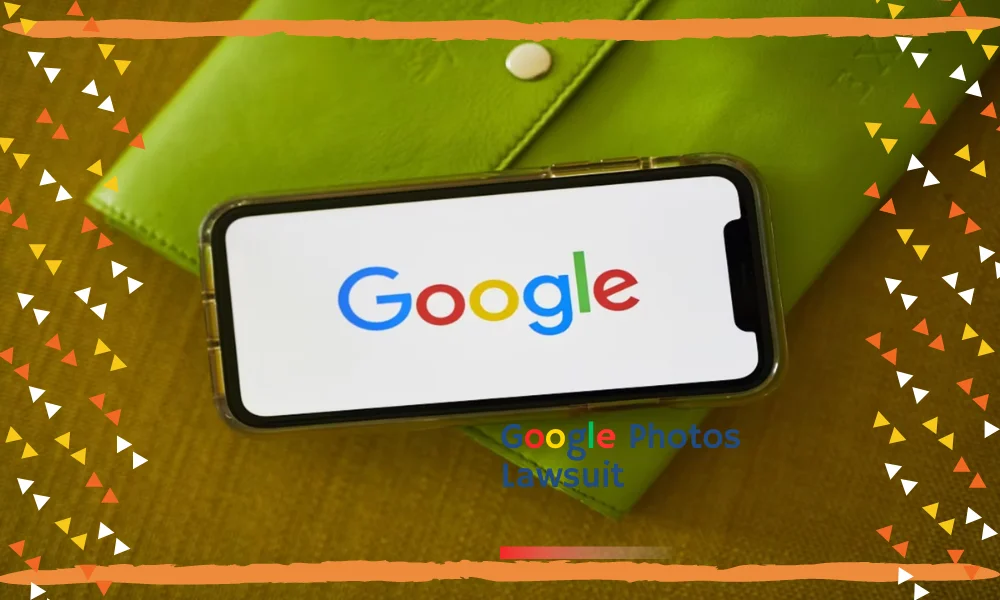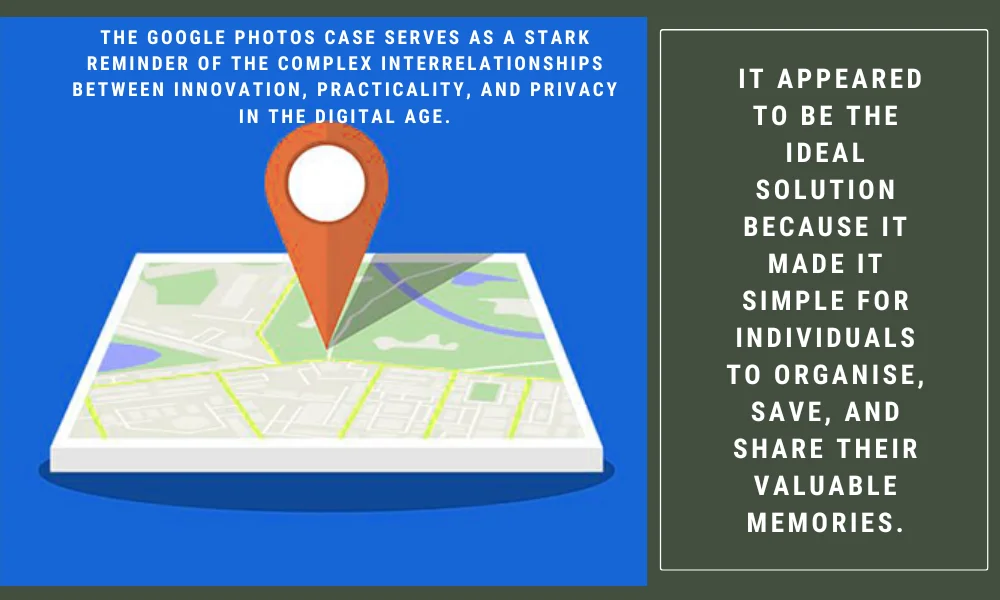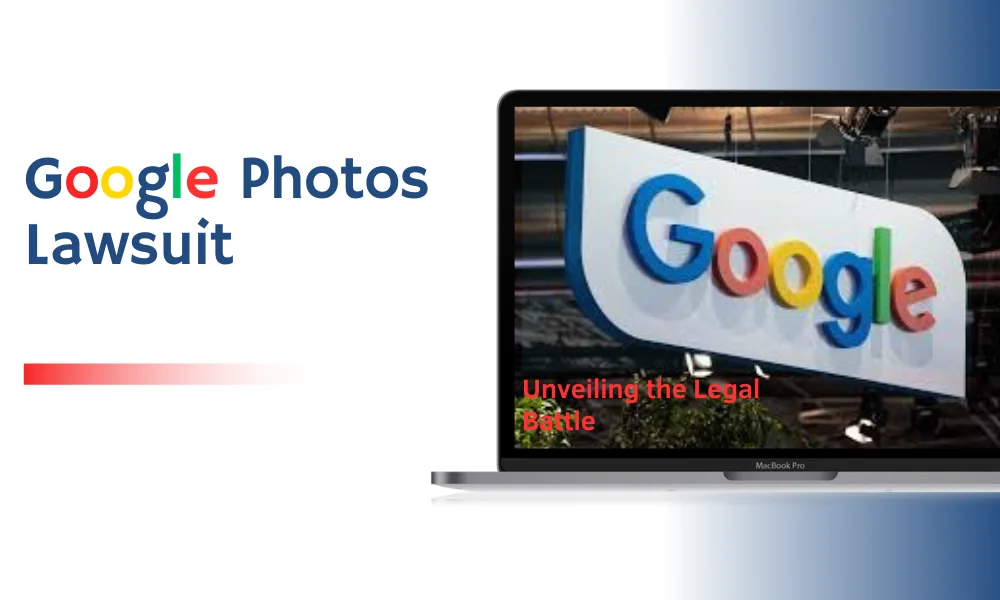Introduction
Google Photos is a well-known brand in the era of digital photos and cloud storage. It looked like the perfect solution, giving people the ease of organising, saving, and sharing their priceless memories.
A legal storm has been developing, despite the façade appearing to be faultless. This article explores the complexities of the Google Photos case and clarifies the issues raised by it. (Google Photos Lawsuit)
In the age of digital photography and cloud-based storage solutions, Google Photos has emerged as a ubiquitous platform. It looked like the perfect solution, giving people the ease of organising, saving, and sharing their priceless memories.

However, beneath the surface of this seemingly flawless service lies a brewing legal storm. This article delves into the intricacies of the Google Photos lawsuit, shedding light on the controversies and concerns surrounding it.
We will unravel the journey from the rise of Google Photos to the unfolding legal battle, and explore the impact it has had on users and the broader tech landscape. Join us on this informative journey as we unveil the details of the Google Photos lawsuit and its implications for the digital age.
How credible is the Illinois Google lawsuit?
The payment comes after Google settled a class-action complaint that claimed the company had violated Illinois’ Biometric Privacy Law with its face grouping feature, which groups similar pictures together in Google Photos.
According to state legislation, businesses must get consumers’ agreement before collecting and storing their biometric data.
Legal action against Google Photos in Illinois?
According to the lawsuit, Google broke Illinois law when it collected and retained biometric information from images that were kept in “Google Photos.” A judge approved a $100 million settlement with the state of Illinois in September of last year. Claimants who filed a legitimate claim should now anticipate receiving their reimbursements.
How do you get your $23 million privacy settlement from Google? (Google Photos Lawsuit)
How can I submit a claim for a settlement? Anyone who qualifies may complete a claim form online and submit it, or they may mail a printed form. To be taken into consideration, your claim form must be delivered before July 31, 2023, either online or with a postmark. It takes two steps to submit an online claim for this settlement.
Has Google ever been successfully sued?
In the case of United States v. Google Inc., the Federal Trade Commission (FTC) was awarded the largest civil penalty it has ever received: a $22.5 million judgement for civil penalties and a stipulated order for a permanent injunction.
The Rise of Google Photos
Innovation leads to dominance
In 2015, Google images became available as a free, streamlined platform for anyone to keep their images and movies online.
It immediately became a top choice for millions due to its strong search capabilities, limitless storage, and seamless interaction with other Google services.
A Digital Photo Management Game-Changer
Upon its launch, Google Photos disrupted the digital photo management landscape. It offered users unlimited storage space, freeing them from the constraints of device memory and external hard drives.
Both individuals and families liked the ease of uploading, searching, and sharing images and videos.
The Power of Artificial Intelligence
The strong artificial intelligence (AI) capabilities of Google Photos were one of the main elements that helped the service gain prominence. (Google Photos Lawsuit)
The technology was able to categorize images automatically by identifying faces, objects, and even geographic places. Users were able to easily organize their enormous digital collections because to this level of automation.
Integration with the Google Ecosystem is seamless.
The seamless integration of Google Photos with other Google services was another positive feature. Users found it difficult to resist the integrated digital ecology that was made possible by Google Photos’ simple access to photos and movies stored in Google Drive.
Through this integration, user collaboration on projects and the sharing of photographs was made simpler.
User-Centered Design
Google Photos prioritized the user experience. It could be used by a variety of people thanks to its user-friendly interface, which required little to no technical knowledge.
Google Photos catered to everyone’s demands, whether you were a casual photographer, a family historian, or just trying to clear out your smartphone.
The Quick Ascendance to Prominence
Google Photos had a rapid rise in popularity. With the promise of hassle-free photo management, limitless storage, and the magic of AI, millions of customers rushed to the service.
The platform’s development was exponential, solidifying its position as a digital juggernaut in the storage and organisation of photos.
As we go more into the Google Photos narrative, we’ll examine both the product’s spectacular rise and the problems and legal disputes that have soured this once-celebrated breakthrough.
The Gathering of User Data
The popularity of Google Photos was influenced by its AI-powered capacity for image analysis and classification. But this led to questions regarding data collecting and user
privacy.
The Class-Action Lawsuit’s Legal Battle Plays Out
A class-action lawsuit was filed against Google images in 2021 on the grounds that the corporation had breached consumers’ privacy by scanning and analyzing their images without their express permission.

Breaking the Trust
Users felt cheated when they learned that their private moments were being used without their consent for data mining and targeted advertising.
Google’s Defense
Google stated that customers had the choice to turn off specific features and that its data gathering practices were clearly outlined in the terms of service.
However, detractors said that these conditions were tucked away in the small print.
The Impact on Users
The Decline in Trust
Users’ trust in Google Photos and the larger tech sector was damaged by the case and the accompanying media coverage.
People started to wonder how much information was actually collected by other computer services they used.
Looking into Alternatives
Many people started exploring for Google Photos substitutes that placed a higher priority on privacy and openness. This change affected Google’s hegemony in the cloud storage sector.
The Ongoing Battle
Legal Manipulation
The Google Photos case is still pending as of [Current Date], and a resolution is not in the cards. It’s a drawn-out court dispute since both sides keep putting their cases and supporting materials forward.
The Greater Consequences
With regard to user permission, data privacy, and the duties of tech oligopolies, this lawsuit has broader ramifications for the whole tech sector.
Conclusion (Google Photos Lawsuit)
The Google Photos case serves as a sharp reminder of the intricate relationships that exist in the digital era between innovation, convenience, and privacy.

Tech businesses must exercise caution as users grow more aware of their data rights if they want to continue earning their trust.
The ongoing Google Photos litigation, which began in [Year], has made us face the complex confluence of technological advancement, user privacy, and the duties of tech titans in the digital era.
As we reach to the end of this investigation, it is clear that this legal dispute is not only one instance, but also a representation of more significant problems in the tech sector.
The Google Photos case emphasizes the value of user permission and data protection at its core.
A significant flaw in how internet corporations manage personal data was revealed by claims that Google images scanned and analyzed users’ images without getting their explicit approval.
Users felt vulnerable and betrayed as a result of this violation of trust, which made many of them doubt the business practices of other tech businesses.
Beyond Google Photos alone, this lawsuit’s effects are wide-ranging.
It acts as a wake-up call for the whole digital sector, sparking conversations about moral data gathering, open terms of service, and the need for stronger user protections.
Customers are seeking more control over their digital identities in a time when data is the new currency.
Looking ahead, it is obvious that this legal dispute will have a significant effect. Tech firms will need to adjust to a shifting environment where user privacy is prioritized.
The Google Photos lawsuit is a sobering reminder that innovation requires balance with accountability and that user trust is a priceless resource that should never be taken for granted.
In conclusion, the Google Photos litigation is more than just a legal issue; it represents a turning point in the development of the digital era.
It emphasizes the significance of striking a balance between innovation and privacy and openness, and it pushes digital businesses to review their procedures in order to better safeguard and respect the rights of their customers.
The future of data privacy and digital innovation will be shaped by the lessons we learn from this litigation as time goes on.
FAQs (Google Photos Lawsuit)
1. Why was Google Photos sued in the first place?
Allegations that Google photographs violated user privacy by scanning and analyzing users’ photographs without their express permission led to the lawsuit.
2. How did consumers respond to the legal action?
Many users felt misled and started exploring for Google Photos alternatives that put privacy and openness first.
3. Is the legal action still pending?
Yes, the litigation is still pending and there is no indication that it will end soon.
4. What broader effects might this legal action have?
Concerns about user permission, data privacy, and the duties of tech corporations in the digital era are raised by the complaint.
5.Why did Google Photos file a lawsuit?
Allegations that Google photographs violated user privacy by scanning and analyzing users’ photographs without getting their express agreement led to the filing of the Google Photos lawsuit.
6. From whom can I get more information on this subject?
Access Now: Lawsuit Against Google Photos
The Google Photos lawsuit has changed the course of digital photography and data storage. It serves as a reminder that businesses must not discount the significance of user consent and transparency in their quest of innovation.
The future of data privacy in the tech sector will undoubtedly be shaped by how this legal dispute plays out.
7.How did the Google Photos lawsuit turn out?
According to the lawsuit, Google broke Illinois law when it collected and retained biometric information from images that were kept in “Google Photos.” A judge approved a $100 million settlement with the state of Illinois in September of last year.
Claimants who filed a legitimate claim should now anticipate receiving their reimbursements.
8.Legality of Google Photos lawsuit?
Google is accused of breaking Illinois law by collecting and keeping people’ biometric data through Google Photos without their knowledge or consent, according to a lawsuit filed earlier this year in Cook County Circuit Court.
9. Is the class action case against Google valid?
A class action lawsuit says that Google inappropriately shared users’ search histories and inquiries with other websites and businesses, leading to the potential award. Without denying any wrongdoing, Google is paying $23 million to settle the lawsuit.
10.How much did Google Photos settle the Illinois court case for?
Residents who were impacted were instructed to submit a claim form. Residents claim to have received payments totaling $95.38 this week. Class-action participants were entitled to a portion of the settlement if they were seen in a Google Photos app image between May 1, 2015, and April 25, 2022.
11.Are Google Photos going away?
There is no longer infinite free storage for Google Photos. This is how to…
As of June 1, Google Photos no longer offered unlimited free photo and video storage. Your 15GB of free Google account storage will now be applied to any new photos and videos you upload. But don’t worry, they won’t count towards the cap because you uploaded them before that time.
12. A photo ever lost on Google Photos?
Your content may be erased if you are inactive in Google Photos for two years or more. Learn about the inactivity policy for Google Photos.
13.Google, why are you being sued?
A “deceptive and anti-competitive scheme”
Because Google and its parent company Alphabet have illegally obtained and are maintaining monopolies over the advertising technology (or “ad tech”) tools that publishers and advertisers use to buy and sell online ad space, the business argues that publishers are failing to notice the growth in ad expenditure.
14.Where do photos that are removed forever go?
A Google Photos-backed image or video that you delete will remain in your trash for 60 days. An item will remain in your trash for 30 days if it is deleted from an Android smartphone running version 11 or higher without being backed up. (Google Photos Lawsuit)

